2025 Faculty Award honorees
Click on the bars below to read biographies of this year's class of Faculty Award recipients.
Click on the bars below to read biographies of this year's class of Faculty Award recipients.

Beeler
Faculty Risk Taker
Angela Beeler, associate professor of school psychology, Department of Intervention Services and Leadership in Education, College of Applied Studies
Angela Beeler earned the Bachelor of Arts in psychology and a minor in criminology from the University of South Florida in 2013 and the Master of Science in educational psychology, specializing in school psychometrics in 2014 and the doctorate in educational psychology with a school psychology concentration in 2018, both from Oklahoma State University. Beeler joined the WSU faculty in 2018. She received WSU's Young Faculty Risk-Taker Award in 2020.
————————
Angela Beeler has what has been described as an "unwavering commitment" to provide solutions for the critical need for mental health and other services for underserved Kansas children and their families.
"Her work embodies the spirit of risk-taking that this award seeks to honor — demonstrating courage, vision and a dedication to creating meaningful and lasting impacts," wrote Sandra Fuentes, a graduate research assistant in the WSU school psychology program, in a letter supporting Beeler's nomination.
When Beeler first joined the WSU faculty in 2018, she started reaching out to Kansas school districts and agencies working with children with special needs to determine community needs and how the WSU school psychology program could better prepare its graduates.
That initial outreach has led to initiatives — and to risk-taking awards for Beeler — that are filling gaps in mental health services and professional service providers.
Five years ago, Beeler was recognized with the WSU Young Faculty Risk-Taker Award for helping establish a graduate certificate program in the in-demand field of Applied Behavior Analysis (ABA), an evidence-based treatment for behavioral issues.
WSU is now expanding that program with a new Master of Education degree in ABA to help address Kansas' shortage of qualified board-certified ABA professionals. The online degree program will launch in August 2025.
This year, Beeler is being recognized for creating a program that is helping reduce high-level behavior interventions for children in rural Kansas school districts and providing essential field training for future practitioners.
The WSU School Psychology Partnerships to Increase Rural School-based Services (SPIRSS) project grew out of a summer 2022 query from school nurse Canyon Hamm, who asked Beeler what kind of support was available to help students in USD 254 in Barton County.
With limited resources, Beeler and Hamm collaborated on a three-semester pilot project to gather data and demonstrate the need for an expanded, longer-term program.
The data helped Beeler earn a five-year $2.3 million grant from a U.S. Department of Education division. Now in year three, the grant is funding partnerships with three rural school districts where nearly 20 WSU school psychology students have provided telehealth services to about 125 K-12 students. Before the SPIRSS partnerships, the school districts didn't have a structured, data-driven way to screen students who need tiered mental health support or the resources to provide that support.
The grant has also funded to date three year-round graduate research assistant positions and seven full-tuition scholarships to the WSU school psychology program.
Patty Nuhfer, a WSU assistant professor of school psychology, calls the program "groundbreaking."
Hamm describes it as having "changed the lives of a multitude of students in our school district would not otherwise have access to the types of services the program has provided."
The district has seen a substantial decrease in the number of students who needed the most intensive level of interventions for their behaviors, Hamm wrote in her letter of support. At the beginning of the fall 2024 semester, for example, 27 USD 254 students were receiving what is categorized as Tier 3 interventions. After receiving services through the SPIRSS program, 20 of those students had improved and were moved to lower tiers of interventions.

Cheng
Leadership in the Advancement of Teaching
Jen-Chi Cheng, associate professor, Department of Economics, W. Frank Barton School of Business
Jen-Chi Cheng earned the doctorate in economics from Vanderbilt University in Nashville, Tennessee, in 1989. Cheng joined the economics faculty at WSU in 1989 and served as the department chair from 1996 to 2024. He received the 2008 WSU Excellence in Teaching Award and the 2011 Academy for Effective Teaching Award.
————————
It's not unusual for students to switch their major to economics once they've taken Jen-Chi Cheng's "Money and Banking" (ECON340) or "International Economics and Business (Econ672/IB561) classes.
"His courses remain the department's top recruiting tool," wrote Siyu Wang, who succeeded Cheng as department chair in fall 2024, in her nomination letter. "He has inspired generations of students."
In fact, two of his current department colleagues are former students. When new faculty join the department, Cheng has "generously shared his wisdom on preparing for courses, communicating with students, and teaching effectively. He truly embodies the role of teacher and leader for all professors in the department," Wang wrote.
Every Friday, Cheng and several current and retired economics faculty meet for lunch to discuss teaching strategies or share examples of outstanding students.
Faculty from other departments interact with him often as well about helping students while alumni frequently credit him as a pivotal figure in their WSU experience.
While the topics Cheng teaches, including "International Economics and Business," are often about transactions, he takes a deeper approach to form connections with students.
He has a standing offer to meet over coffee and doughnuts every other week for students in his online classes. He lets students know they can email him on weekends and holidays, and he'll respond. When he spots potential, he readily offers to write recommendation letters for students. It's not unusual for former students to stay in touch several years after they've left his classroom.
"Helping students is so important and makes me so happy," Cheng said. "I feel that if I can make a change in my students' lives, regardless of their level of academic achievement, when they have trouble understanding the subject or even in their personal life, I am satisfied."
He recalled one instance when a student raised his hand to share his method of calculating interest. After class, Cheng encouraged him to bring up his grade point average and pursue a master's in economics.
"He became a professor at MIT," Cheng said with pride.
About 25 years ago, Cheng started a peer tutoring program for business majors that serves about 120 students every year.
"I think students are sometimes more comfortable talking to one another than professors," he said.
For the past several years, Cheng has led a summer study abroad program to ESC Pau Business School in Pau, France. The program is open to any WSU major.
In addition to teaching and advising students at WSU, Cheng has continued researching, writing and presenting on various economic issues. He serves on the editorial boards of two international economics journals and is an ad hoc reviewer for a third journal. He also helps evaluate prospective students who apply to his alma mater, Vanderbilt University.
In 2020, Cheng helped raise $50,000 to fund a scholarship named for retiring colleague Martin Perline, another popular and award-winning economics professor. In 2023, his colleagues followed suit and established a scholarship in Cheng's name to recognize his achievements with students, faculty and alumni.
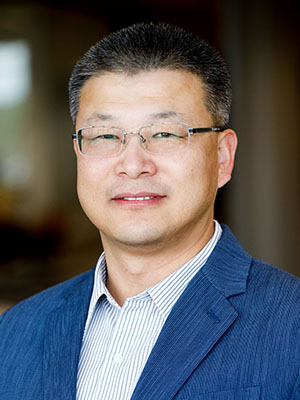
Gu
Excellence in Research
Shuang Gu, associate professor, Department of Mechanical Engineering, College of Engineering
Shuang Gu earned a bachelor's degree and a doctorate in chemical engineering in 2000 and 2007, respectively, from Dalian University of Technology in China. After working as a researcher at the University of California, Riverside and the University of Delaware, Gu joined the WSU faculty in 2015. He was previously recognized with the WSU Excellence in Research Award in 2019.
————————
By quickly establishing a strong, impactful research record, Shuang Gu has impressed his WSU colleagues and others ever since joining the WSU faculty in 2015. His achievements led to his early tenure and promotion to associate professor in 2020 and now his second WSU Excellence in Research Award. He was just named the Sam Bloomfield Chair in Engineering Professor, effective May 11.
Colleen Pugh, former WSU vice provost for research and the current Graduate School dean, calls Gu a research superstar.
In the past five years alone, he has secured six highly competitive research grants worth more than $3.2 million for his research into environmental sustainability and green energy. Even U.S. Sen. Jerry Moran took notice of Gu's success, sending congratulatory letters after Gu received back-to-back major National Science Foundation grants.
In that same time frame, Gu published nine peer-reviewed journal articles in highly rated journals, bringing his total number of published journal articles and book chapters to 68. Based on the Google Scholar database, the number of citations of his publications has nearly doubled to more than 10,150 in the past five years. Six of his articles have received more than 500 citations each, while 26 articles have been cited more than 100 times each.
Gu's major research projects center around mitigating the harmful environmental effects of two commonly used products. It's essential work, Gu said, considering "everybody is a victim" when it comes to pollution.
With a $700,000 NSF grant in 2022, Gu and his research group are working to curb the pollution and damage caused by road salt. A cheap way to get rid of ice on paved surfaces, the liberal use of rock salt comes with high costs, causing corrosion to vehicles and highways and contaminating drinking water and soil. Gu's group is researching a process to convert concentrated salt from wastewater into a noncorrosive deicer like that used at airports and military facilities — but with a cheaper price tag and without using natural gas.
With a $2 million NSF grant awarded in 2023, Gu is leading a group of five interdisciplinary researchers at WSU who are working on producing affordable eco-friendly fertilizers that could replace nitrous oxide-intensive fertilizers. The latter are major contributors to greenhouse gas emissions. Wind and solar energy would be used to produce the new fertilizers. The WSU team is working alongside a research team from Iowa State University, which also received a $2 million NSF grant, in this venture.
Gu's proposal on the fertilizer research project was so thorough and strong that, according to NSF program director Casonya Johnson, it was the only submission that didn't have any weaknesses identified by the NSF's broader impacts review panel, Pugh noted in her support letter for Gu's nomination for this year's Excellence in Research Award. According to the NSF website, the broader impacts review process determines "the potential for a project to benefit society and achieve specific, desired societal outcomes."
Gu has established a new research lab, called the Clean Energy Innovation Lab in Wallace Hall, where graduate and undergraduate students can also conduct research. He is currently advising six Master of Science and four doctoral students.

Jameson
Academy for Effective Teaching
Mary Liz Jameson, professor, Department of Biological Sciences, Fairmount College of Liberal Arts and Sciences
Mary Liz Jameson earned a Bachelor of Science degrees in biology and Great Plains studies in 1986 and a Master of Science in entomology with a minor in zoology in 1988, both from the University of Nebraska-Lincoln. She earned a doctorate in entomology from The University of Kansas in 1997. After academic appointments at Nebraska-Lincoln, she became a research associate at WSU in 2008 and joined the faculty as an associate professor in 2010.
————————
From discovering a pathogenic fungus not found previously in Kansas to helping nonmajors understand basic science to providing farmers with the latest scoop on dung beetles, Mary Liz Jameson is a natural in the field and in the classroom.
As an entomologist, Jameson has discovered and named 50 new species; eight have been named in her honor.
As a teacher, she's particularly passionate about the class Human Organism (Bio106), which is part of WSU's general education curriculum. Offered in the spring semester, the class, which draws as many as 150 students, is the most important class she teaches, Jameson said.
"These students are going to go on to accounting, education, art, music and other careers so it's probably the last time they ever take a biology class," she said.
With that in mind, Jameson ensures class content is compelling and relevant, using current events to show how science is important.
This spring semester, for example, she included topics ranging from the efficacy of Ozempic and similar medications in diabetes and weight-loss treatment to the impact of the hottest year on record (2024) on human health and hospitals to new testing and treatments for common conditions such as dementia and food allergies.
"It's a particularly important class — uber, uber important — because it helps them understand how to vote, how to take care of their families, where to find good information, how to talk to doctors and more," Jameson said.
She also teaches General Biology II (Bio211), an introductory course for majors in biology and certain health professions, and she has developed three upper-level courses: Entomology (Bio532), Field Ecology (Bio575) and Biodiversity Analysis (Bio725).
The Field Ecology class was the first course offered at WSU's Biological Field Station building at Ninnescah Reserve, the oldest of the department's four field stations. The setting has provided fertile ground for students to engage in field research protocols, where data is collected and analyzed.
One such protocol led to the important discovery that the amphibian-killing Chytrid fungus had reached Kansas; the confirmation was reported in mainstream and scientific publications.
Kansas farmers and ranchers often call on her to understand what's happening to dung beetles, which Jameson calls "the uncelebrated heroes of grassland health." Agrochemicals, including ivermectin and antibiotics, have decreased dung beetle populations, which results in less plant growth for grazers.
Last year she collaborated with colleagues from the Smithsonian and Kansas State University to hold a workshop that provided what she called the "poop scoop" on dung beetle to land managers.
In 2021, she became an honorary member of The Coleopterists Society, the highest level of distinction given by the group dedicated to studying beetles. Nominated by her former students, Jameson became just the third female honorary member since the society's founding in 1947.
In 2024, she became just the third WSU faculty member to be elected a fellow of the prestigious American Association for the Advancement of Science for her extraordinary contributions to science.
Also in 2024, Max Proctor, a graduate student who came to WSU to specifically work with Jameson, won a coveted and highly competitive National Science Foundation Graduate Research Fellowship to continue researching scarab beetles.
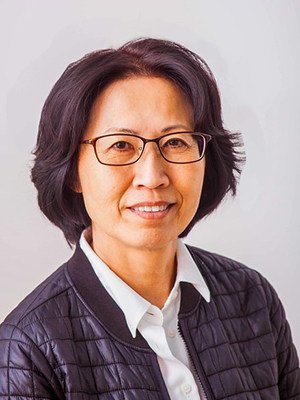
Kung-McIntyre
Excellence in Online Teaching
Kate Kung-McIntyre, senior educator, Department of Management, W. Frank Barton School of Business
Kate Kung-McIntyre earned a Bachelor of Science in marketing and management from Newman University in 1994 and a Master of Business Administration from the Barton School in 2000. After five years with Bombardier, she joined the WSU faculty in 2005 as a lecturer in the management department and assistant dean for undergraduate programs in the Barton School; she held the latter position until 2013.
————————
Having already experienced how businesses integrate technology through her industry experiences, Kate Kung-McIntyre embraced and understood the nuances of online teaching before it became commonplace at WSU.
"Kate has been a cornerstone of online teaching within the Barton School of Business since she began teaching hybrid and online courses in 2012," wrote Christopher Stone, chair of the management department, in his nomination letter. Recently, she became the department's mentor to help new adjunct instructors build and deliver successful online courses.
From the outset, Kung-McIntyre knew she needed to create an online learning environment that is "engaging, rigorous and transformative," she said. "My students' feedback — ranging from appreciation for clear communication and innovative assignments to recognition of my supportive teaching style — reinforces my dedication to this mission."
She regularly teaches two management courses, "Designing Successful Organizations" (MGMT460) and "Building Remarkable Teams" (MGMT463), and "International Business" (IB333). The latter is part of the Barton School's Assurance of Learning assessment required for accreditation; 80% or more of her students regularly meet the post-test goal of understanding international business concepts.
Her professional certifications as a Quality Matters peer reviewer, a QM project management professional and an Amazon Web Services cloud practitioner "ensure her courses maintain the highest standards of online pedagogy while integrating cutting-edge tools and global business perspectives," Stone said.
In his letter of support, Steven M. Farmer, the W. Frank Barton Distinguished Chair of Business, wrote that Kung-McIntyre's ability to teach very different courses to very different audiences with similar outstanding results is "the hallmark of a master online teacher." Kung-McIntyre credits Farmer with convincing her to give up the corporate world for the college classroom in 2005.
One of the first lessons she teaches is how to communicate effectively and professionally, as expected in a business environment.
"We are living in a world of digital communications. You are what you email. People will shape their opinion of you according to the quality of your email messages. … Digital communication styles define you as a person in the virtual world," she said.
Kung-McIntyre provides her students with well-organized and detailed rubrics, answers emails promptly, meets with them virtually outside of class time, and assigns collaborative group projects, such as the community service project in "Building Remarkable Teams," so that students can learn how to work in teams and complete projects in a remote environment.
Based on her numerous ongoing consulting and entrepreneurial endeavors — including an appearance in a season 13 episode of the popular TV business show "Shark Tank" — Kung-McIntyre also integrates real-world insights and anticipates new business trends and perspectives.
Kung-McIntyre appeared on "Shark Tank" in February 2022 as one of the co-founders of Pinole Blue, a Wichita-based start-up that makes food products using pinole, a blue corn-based superfood. The company's other co-founder is Eddie Sandoval, one of Kung-McIntyre's former students whom she advised when he competed in the Shocker New Venture Competition.
"It is awesome to have a Shark Tank celebrity as a professor!" wrote Bryan Hicks in an email thanking Kung-McIntyre for her dedication and commitment to students. "You're truly an asset to WSU and your students."
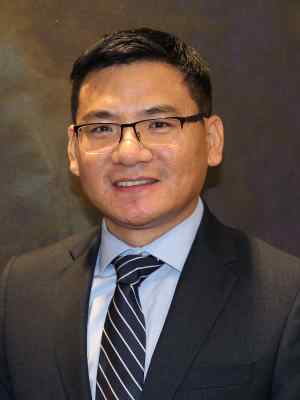
Li
Excellence in Accessibility
Jason Li, associate professor of counseling, Department of Intervention Services and Leadership in Education, College of Applied Studies
Jason Li received a Master of Education in school counseling from Western Kentucky University in 2009 and a doctorate in counselor education and supervision from Texas Tech University in 2013. He joined the WSU faculty in 2014.
————————
From Jason Li's viewpoint, accessibility is an ongoing process of learning and improvement. That's why he proactively asks students for feedback and stays informed about best practices.
His commitment to ensuring accessibility is deeply rooted in his belief that education should be an inclusive and empowering experience for all students, he says.
"As a counselor educator, I cultivate a classroom culture of empathy and understanding where students with needs feel comfortable disclosing their needs and seeking support when they have potential issues related to accessibility," he said.
Jody Fiorini, chair of the Department of Intervention Services and Leadership in Education (ISLE), credits Li with improving the academic experience for all students and helping set standards for accessibility and accommodations for others in the ISLE department.
"It was a pleasure to watch as he investigated strategies and advocated for his students," she wrote in her award nomination of Li. "The best side effect was that we all were able to learn along with him. As he developed strategies that worked to make both online and face-to-face courses more accessible, he shared this knowledge with the rest of his colleagues and as a result, the entire department is both more comfortable and more competent in providing accommodations for students with disabilities."
By including students with disabilities in his research and presenting with them at national and state conferences, "he and his students have gone on to inform other counseling professionals and counselor educators about ways to assist students with disabilities to be successful," she said.
Li applies the research-based Universal Design for Learning framework to ensure his courses support diverse learners. As part of his commitment to accessibility, he thoroughly evaluates textbooks and other materials before adopting or incorporating them into his classes.
He puts down in writing — on syllabi and online modules — the verbal commitment he makes on the first day of class: "I want everyone in this class to succeed. We all learn in unique ways, so if there's anything about that makes it difficult for you to learn or feel included, please talk to me. I'm committed to working with you to find solutions and strategies that address your needs while ensuring you can meet the course requirements."
When he's notified that a student needs accommodation, he contacts the student privately to discuss ways to best make those accommodations and help the student succeed.
It's a gesture students appreciate, based on emails they've sent.
"You have been the best professor I have had during graduate school!" exclaimed one student. Another thanked him for the kindness he'd shown.
Since he teaches primarily online, Li also promotes healthy digital habits to counter the effects of increased screen time. His tips range from avoiding too much contrast between the screen's brightness and one's surroundings to reducing screen fatigue with increased font sizes and frequent breaks to scheduling annual eye exams.

Li
Excellence in Research
Xiaolong Li, assistant professor, Department of Mathematics, Statistics and Physics, Fairmount College of Liberal Arts and Sciences
Xiaolong Li earned a Bachelor of Science in mathematics in 2011 from Tsinghua University in Beijing and a doctorate in mathematics in 2017 from the University of California, San Diego. Before joining the WSU faculty in 2021, he was a visiting assistant professor at UC Irvine and a Britton Postdoctoral Fellow at McMaster University.
————————
In less than four years, Xiaolong Li has become one of the most active researchers in the Department of Mathematics, Statistics and Physics, compiling an impressive publication record, receiving invitations to speak about his research and securing three major grants.
Li is an expert in geometrical analysis, using partial differential equations to investigate the geometric and topological properties of curved spaces, and he has made significant contributions to understanding curvature and its implications in various geometric contexts. Notably, he was among the group of mathematicians who in 2021 proved a curvature conjecture proposed by Japanese mathematician Seiki Nishikawa in 1986.
"Not only does Dr. Li's research advance our understanding of geometric and topological properties of spaces, but it also has potential applications to questions in other scientific disciplines, such as physics, computer imaging, material sciences and mathematical biology," wrote Yale mathematics professor Lu Wang in her letter of support for Li's nomination.
Since joining the WSU faculty in 2021, Li has published 16 papers in top-tier, peer-reviewed journals and he has more than a handful under review. According to department chair Ziqi Sun, who nominated Li, Li far exceeds the department's requirement that faculty have at least one publication every year.
According to Google Scholar, Li's publications have received at least 195 citations. Researchers in Australia, Canada, China, Germany, Switzerland and across the U.S. have relied on Li's original findings in their own research efforts. Given that mathematics is the second least-cited subject of all fields, the citations reflect his international recognition and influence among academic peers.
In another measure of his standing, Li has delivered five research presentations at national conferences and workshops, as well as more than 22 sessions at seminars and colloquiums.
Li's success in securing grant funding is also a testament to his research standing.
"Over the past 30 years or so, very few junior faculty members in our department have received regular National Science Foundation funding prior to tenure," Sun said. "It is clearly much more unusual for a junior faculty to receive more than one major research grant such as NSF."
Of Li's three grant awards, two have been from the NSF, with a combined award of more than $460,000.
While Li goes through "a lot of scratch paper," he said, as he works out equations as part of his research, he also embraces his role as an educator. Besides developing and teaching college courses, he's involved in outreach among pre-college students.
Since April 2022, he's been helping organize the weekly WSU Math Circle meetings between youth and WSU math professionals. He's even learned how to do some magic tricks to make learning fun.
"You can do a lot of tricks with numbers," Li said. Plus, the young students like figuring out how the tricks are done.
For the past three years, Li has been organizing and helping prepare students for the American Mathematics Competition 8, a contest sponsored by the Mathematical Association of America that tests students in grades 8 and below. His competitors have always done well; this year, two scored in the top 5% among all AMC 8 competitors.
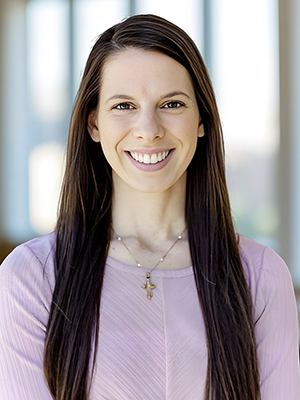
Murnan
Young Faculty Scholar
Reagan Murnan, assistant professor, Department of Teacher Apprenticeship Pathways, Literacy and Special Education, College of Applied Studies
Reagan Murnan earned a Bachelor of Arts in history in 2012, a Master of Education in special education in 2013, and a doctorate in education with a specialization in special education and a secondary emphasis in reading in 2023, all from George Mason University. She also earned a graduate certificate in applied behavior analysis in 2024 from Florida Tech University. She joined the WSU faculty in 2022.
————————
When it comes to finding an inspirational role model for overcoming challenges, Reagan Murnan looks to the first American recognized by the Vatican as a saint, Sister Frances Xavier Cabrini.
Through her work on behalf of special education teachers, students and families, Murnan tries to emulate the zeal and commitment to serve that St. Cabrini conveyed in her famous quote: "The world is too small for what I intend to do."
"The world of special education is underfunded and underserved … and doing just good enough is not enough," Murnan said. She said it might sound dramatic or even corny, but "my life is not my own and it shouldn't be. I happily give it to the field, and I happily give it to my teachers and the families and students they serve. I feel like I have influence to (create) change."
Murnan's research — praised for its rigor and high quality by her dissertation chair, George Mason professor Anya Evmenova — delves into structured literacy interventions, special education pathways and teacher preparation.
With an ability to blend academic research with practical applications, Murnan is an emerging leader in fostering inclusive education and improving instructional practices.
Murnan, for example, was among faculty from four Kansas universities who collaborated on a series of modules to standardize and enhance the field and practicum experiences for future early childhood and elementary education teachers studying at WSU, The University of Kansas, Kansas State and Emporia State.
Her research into virtual professional development opportunities has been used to implement collaborative groups of educators, known as professional learning communities, where strategies for instructional improvement and responsibilities for student success are shared.
"Dr. Murnan's innovative research on Universal Design for Learning and technology-enhanced instruction has been particularly influential, providing educators with practical strategies to support diverse learners," according to Murnan's award nomination letter by Jennifer Friend, dean of the College of Applied Studies.
In less than three years at WSU, Murnan has authored 13 peer-reviewed publications and delivered 20 presentations at national and international conferences of leading professional groups, including the Council for Exceptional Children, the Literacy Research Association and the Association of Teacher Educators.
"These articles and presentations, which often bridge the gap between research and practice, have had a substantial impact on the discipline, evidenced by citations and inclusion in professional debates," Friend wrote.
With her firsthand experience teaching in a suburban Washington, D.C., middle school, Murnan is familiar with the challenges special education teachers face: the limited administrative support, the high demands on time and energy, and the complex and diverse needs of students.
She parlayed that experience into a collaborative study that focused on educator well-being. Murnan has since made several presentations on the multidisciplinary biofeedback training program that she and a counseling faculty member designed to help special education teachers manage stress.
In another effort to uplift special educators, Murnan and WSU colleague Heidi Stinchcomb launched "A Picture is Worth a Thousand Words," a visual storytelling project that invited special education teachers to submit photographs capturing what the field means to them.
As Murnan anticipated, the photos became "a bright light in the darkness," offering a sense of connection and affirming the teachers' commitment to supporting their students, whom they often refer to as "their kids," she said.
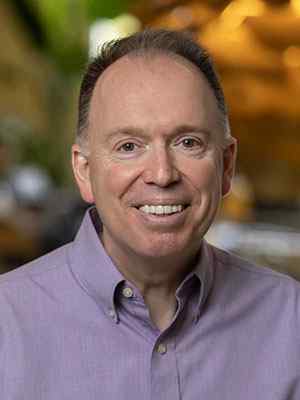
Rawson
Excellence in Teaching
Brian Rawson, associate educator, Department of Management, W. Frank Barton School of Business
Brian Rawson earned a Bachelor of Science in organizational psychology from Brigham Young University in 1986 and a Master of Business Administration from The Darden Graduate School of Business, University of Virginia in 1993. Following 25 years in consulting, management and executive roles in the corporate world, Rawson became a Barton School lecturer in 2008. He received an Academy for Effective Teaching Award in 2015.
————————
Since joining the Barton School of Business faculty in 2008, Brian Rawson has parlayed his executive-level experiences with prominent, international companies into a teaching style that's called dynamic and engaging by not only his students but also his colleagues.
"Brian has established himself as a cornerstone of our faculty, excelling in teaching a diverse range of courses across management, international business and leadership disciplines," wrote Larisa Genin, dean of the Barton School, in her letter of support. "Few faculty members manage the breadth and depth of teaching that Brian does — covering multiple distinct courses and generating more than 600 student credit hours each semester."
Students say his ability to tie course content to real-world scenarios provides practical insights and better prepares them for professional challenges. It also makes the content relatable and memorable, they say.
While Rawson has plenty of examples from his own career to draw upon, he encourages his students to share scenarios based on their experiences and current topical situations.
"This leads to every class period being different from another class in which we may cover the same principles and material," Rawson said.
He also uses simulations and role-playing in his classes.
"At the heart of Brian's teaching philosophy is a student-centered approach that prioritizes learning outcomes over teaching mechanics," according to Christopher Stone, chair of the Department of Management.
His teaching acumen has earned high praise from one of the business school's most prolific and well-regarded faculty members.
"In my five-plus decades of university life, I have been blessed to work with hundreds of capable colleagues," wrote Gerald Graham, the R.P. Clinton Distinguished Professor of Management, in his letter of support. "Professor Rawson is one of the absolute best teachers I have ever encountered —a rare instructor that all of us wish we had studied with."
Despite his numerous teaching accolades, including the WSU Academy for Effective Teaching Award in 2015, Rawson remains committed to improvement. He actively seeks feedback through a concept he calls "Start. Stop. Continue."
"I ask what we should start doing in future classes that we didn't do today, what we should stop doing in future classes that we did today and what we should continue doing in future classes that we did today," Rawson said.
Perhaps one of the most compelling aspects of Rawson's contributions at WSU is that he's not only preparing students for academic success but also for life beyond the university, Genin said.
"His courses are designed to equip students with the critical thinking, collaboration, and leadership skills necessary to thrive in an ever-evolving global economy," she said. "By sharing his own experiences and fostering an environment of accountability, Brian ensures his students graduate not just with knowledge, but with the confidence to lead and succeed."
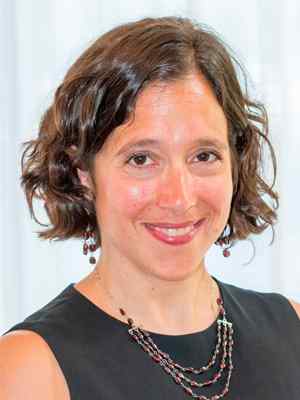
Showstack
Excellence in Community Research
Rachel Showstack, associate professor of Spanish, Department of Modern and Classical Languages and Literatures, Fairmount College of Liberal Arts and Sciences
Rachel Showstack received a Bachelor of Arts in history from the University of California, Santa Cruz, in 2001, a Master of Arts in Spanish from Sacramento State University in 2006, and a doctorate in Hispanic linguistics from The University of Texas at Austin in 2013. She joined the Wichita State faculty in 2013.
————————
Language barriers between a patient and a doctor can literally be a matter of life or death.
That's why the research and work that WSU linguist Rachel Showstack is doing to break down those barriers is critical to helping improve health outcomes for Spanish-speaking patients.
It's a line of inquiry Showstack discovered while continuing her research into Spanish as a heritage language after joining the WSU faculty in 2013.
As Showstack interviewed young adult Kansans who grew up speaking Spanish, "It was interesting to learn that one of the main reasons that they wanted to maintain and develop their Spanish skills was to support their communities because they had seen the lack of resources, especially in health care, and so that piqued my interest," she said.
That interest led her to create a new practicum course for WSU's Spanish for the Professions Certificate Program and establish a coalition of Spanish-speaking families and patients, interpreters, health care providers, community leaders and WSU faculty and students called Alce su Voz (Spanish for "speak out") in 2020.
Besides providing pathways to help improve health equity, her work has led to significant grants, a unique feat amongst those in the humanities, and an extensive publication and presentation record that is drawing attention to how community-engaged linguists can impact health equity.
"Listening to Dr. Showstack in the first meeting of Alce su Voz and (listening) to her ideas, I thought that it was exactly what we needed in our community," said Rommy Vargas-Bezzubikoff, president of Spanish Ad Hoc Translations and former coordinator of USD 259's translations department. "Members of the community and of Alce su Voz benefit from her expertise, vision and knowledge."
In his nomination support letter, Diego Pascual y Cabo, associate professor of Spanish and linguistics at the University of Florida, noted that Showstack, already well-known among scholars of Spanish heritage language learning, is now being recognized for her "pioneering work for health equity in Latinx communities."
Since 2019, Showstack has secured more than $1.4 million in grants from the Kansas Health Foundation, the National Endowment for the Humanities and other highly competitive sources for her community research, including an oral history project where members of the Latinx community tell their stories about living through the COVID pandemic in their Spanish and Mayan languages.
"To put this in context, it is common for highly successful academics in the humanities to never receive any grant to fund their research, much less for projects of this magnitude," wrote Susan V.H. Castro, director of WSU's Academic Center for Biomedical and Health Humanities, also known as HealthHum.
"Rachel's research can be credited for changing the narrative around health disparities in the U.S.," wrote Maricel G. Santos, a professor and department chair at San Francisco State University who co-authored "Health Disparities and the Role of the Applied Linguist" with Showstack. The book is among nearly 30 publications, including refereed articles in top-tier journals, books and book chapters, that Showstack has authored or co-authored since joining the WSU faculty.
Praising Showstack for her "crackerjack stamina and passion," Santos added: "Rachel's track record thus far provides ample evidence that she is on the cusp of leveling up her equity work as a community-engaged applied linguist."
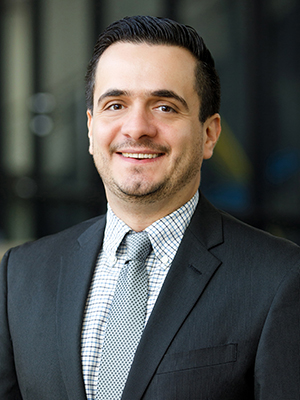
Soares
Young Faculty Risk-Taker
Davi Soares, assistant professor, Department of Electrical and Computer Engineering, College of Engineering
Davi Soares earned a Bachelor of Science in electrical engineering from Universidade Federal de Itajubá (Federal University of Itajubá) in Brazil in 2015, a Master of Science in electrical engineering from Universidade Estadual de Campinas (State University of Campinas) in Brazil in 2018, and a doctorate in mechanical engineering from Kansas State University in 2021. Following a two-year industry career, Soares joined the WSU faculty in 2023.
————————
Like the lithium-ion batteries he researches, Davi Soares demonstrates a high energy level in his teaching and research.
Within a month of joining WSU's Department of Electrical and Computer Engineering, he submitted a grant proposal to Kansas NSF EPSCoR and used the nearly $68,000 he was awarded to build a new research program, wrote Visvakumar Aravinthan, the department chair, in his nomination of Soares for the Young Faculty Risk-Taker Award. Kansas NSF EPSCoR is an initiative that combines monies from the state and the National Science Foundation to advance research efforts in the state.
Research into lithium-ion batteries is an important trend, and it's one of the reasons Soares was recruited to WSU. Lithium-ion batteries have already dramatically impact technology, powering our electronic devices and electric cars. With their capability to store energy generated from solar and wind sources, they provide a more sustainable form of energy.
While lithium-ion batteries are already widely used, researchers continue looking for ways to improve their safety, efficiency and affordability and expand their application.
The rich potential of developing better lithium-ion batteries is why Soares switched to conducting model-based research despite having a strong experimental research background.
It's a rather bold move, according to his colleagues and collaborators.
"As a senior researcher, I recognize the risks with such a transition, particularly for young faculty whose career trajectory depends on productivity and impact," wrote Gurpreet Singh, a professor in the Department of Mechanical and Nuclear Engineering at Kansas State, in his award support letter. Singh, who has known Soares for the past five years and now collaborates on several research projects with Soares, said Soares has set ambitious goals in his research to make high-energy density batteries safer and high performing.
Soares' research program is also impacting educational opportunities for WSU students. In early 2024, graduate student Eric Periera presented his work on modeling at the prestigious International Mechanical Engineering Congress and Exposition. A research paper, co-authored by Soares along with graduate and undergraduate students, is under review for the IEEE Green Technologies Conference.
Soares has also developed the new course Characterization and Modeling of Batteries (ECE777AE).
"Because of Dr. Soares' courage and innovation, WSU students who take ECE777AE are now better prepared for jobs in the cutting-edge battery industry," wrote Jian Wang, an assistant professor in the WSU Department of Chemistry and Biochemistry, in an award support letter.
Soares has partnered with Wang and other WSU faculty to create an interdisciplinary research project that explores potential new uses for metastable 2D materials. The project merges the expertise of Wang's group in materials synthesis with Soares' group in testing opportunities, Wang said.
Before joining the WSU faculty, Soares was an engineer with Freudenberg e-Power Systems in Michigan. The company designs, develops and manufactures high-performance battery and fuel cell systems.

Thomas
Excellence in Creative Activity
Robert Thomas, associate director, School of Digital Arts, College of Fine Arts
Robert Thomas earned a Bachelor of Fine Arts in theater performance from Wichita State in 2016 and a Master of Fine Arts in filmmaking from the Vermont College of Fine Arts in 2020. He joined the WSU faculty in 2022.
————————
Creating connections and eliciting emotions among audiences are often the desired outcomes for documentary filmmakers.
The creatives behind "Hope in the Heartland: Wichita's Quest to End Homelessness" hit their mark, judging by the response of the 250 or so people who attended its October 2024 premiere. The documentary was part of the prestigious Tallgrass Film Festival held in Wichita, and community interest was so strong that an encore screening was added.
WSU faculty member Robert Thomas and several WSU students and alumni were heavily involved in producing the 110-minute film. Thomas was both the director and director of photography.
"Audience members were clapping, gasping and sniffling" through the premiere, according to an article in The Journal, a civic issues magazine produced by the Kansas Leadership Center.
When Pano Marketing —the firm contracted by the city of Wichita to produce the film — invited Thomas in December 2023 to be part of the project, Thomas immediately realized it was "an opportunity to combine meaningful storytelling with hands-on learning for my students," he said.
He agreed to join on the condition that his students be involved. Current and former Shocker Studio students comprised the entire film crew.
"It was incredibly rewarding to work with individuals I had personally taught and to see them apply their skills on a professional set," Thomas said.
The film crew found it rewarding as well, as they learned firsthand how creative filmmaking can impact social advocacy.
Ashlynn Farney, the film's production coordinator, said she learned the most about professionalism through how Thomas interacted with both crew members and interviewees, including how to respectfully allow someone with a different viewpoint to tell their story.
As part of Wichita's efforts to raise awareness about homelessness, panel discussions and feedback sessions have often followed public and private screenings. The sessions provide an opportunity for students to witness the bridge between creative storytelling and community engagement.
Wichita city officials have begun addressing homelessness in earnest in the past few years, putting together a community task force and soliciting millions in federal funding for possible solutions. "Hope in the Heartland" was funded with about $60,000 from a $1 million Department of Justice grant for one of those initiatives.
After Thomas and others started doing initial information-gathering with city officials, community leaders, service providers and people who've experienced homelessness, Thomas suggested switching the project's focus from a standard education campaign to producing a documentary that delved into the deeply personal stories of frontline workers and those who are unhoused. The film prominently featured two city housing case managers and a 22-year-old woman who had been homeless for several years.
"By centering the voices of those directly affected, we ensure that their experiences guide the solutions we pursue," Thomas said.
"Without (Robert's) selfless contributions to the project, it could never have achieved such a high level of quality or created the impact it has had and will continue to have on the community," wrote Austin Steffens in a support letter. Steffens, who runs ICT Film, has worked with Thomas on projects across the U.S. for nearly a decade.
Thomas is currently producing and co-directing a documentary about the ecological significance of bison and prairie preservation in Kansas. Ten students are involved in the new project.
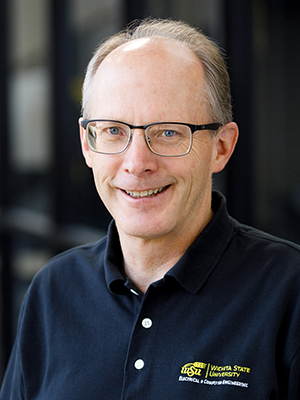
Watkins
Academy for Effective Teaching
John Watkins, professor, Department of Electrical and Computer Engineering, College of Engineering
John Watkins earned a Bachelor of Science in electrical engineering from the University of Nebraska-Lincoln in 1989 and his Master of Science and doctoral degrees in electrical engineering from The Ohio State University in 1991 and 1995, respectively. After nearly a decade teaching in the systems engineering department of the U.S. Naval Academy in Annapolis, Maryland, Watkins joined the WSU faculty in 2004.
————————
There were early signs that John Watkins would be better suited for a career in the classroom rather than the industry career he'd envisioned as an undergraduate: a love of learning as a kid growing up in Nebraska who often had a book in hand and an ability to help classmates grasp material they struggled with.
John Boye, a professor at the University of Nebraska-Lincoln, played a pivotal role in shaping Watkins' career.
"He changed my destiny," wrote Watkins in his teaching statement for the Academy for Effective Teaching Award. "This professor loved students, learning, teaching, and yes, students again."
Boye planted the seed that Watkins consider teaching as a career field, encouraging Watkins to go on to graduate school. He also influenced Watkins' research focus in feedback control systems.
After earning his doctorate, Watkins' first teaching job was at an institution with high standards for its students and faculty: the U.S. Naval Academy.
"At the Naval Academy, I learned how to teach and, more importantly, how students learn," Watkins said.
However, one of his goals was to teach graduate students, which led him to Wichita State where he met another influential mentor: Edwin Sawan, "who shared my interest in students and my interest in control systems." Sawan received the Academy for Effective Teaching Award in 2009.
"If I can bring even a fraction of the joy of learning to my students that I have received from my mentors, I will have made a difference in the lives of many students," Watkins wrote in his statement. "Students need to know that you care about them. Students need to know that you care about the material you are teaching. … If you drop the ball on either of these ideas, you will lose them."
Letters of support from graduate students who went on to teaching careers indicate Watkins has indeed made a difference.
The letters all cited his ability to use real-world applications and scenarios — including one particularly memorable example — to teach highly technical and mathematically intensive concepts.
"Yes, Dr. Watkins could slide down the high friction Wallace Hall classroom floors with ease, only to explain the concepts," wrote Geethalakshmi S. Lakshmikanth(cq), a visiting assistant professor at Emporia State University. The skidding and stopping actions helped illustrate transient and steady states.
Visvakumar Aravinthan has the unique experience of being one of Watkins' former doctoral students and now a colleague and chair of the Department of Electrical and Computer Engineering. He credits Watkins with helping him become a better teacher through mentorship and meaningful discussions about teaching approaches.
"His teaching was not just about delivering content but about creating an atmosphere where curiosity thrived. He consistently drew us into discussions, asked questions, and challenged us to think critically," wrote Tooran Emami(cq), a professor at the U.S. Coast Guard Academy.
She added: "… Dr. Watkins' teaching philosophy remains a cornerstone of my own approach to education. I strive to replicate his ability to inspire critical thinking, foster inclusivity, and build meaningful connections with students in my classroom every day."
Past Honorees